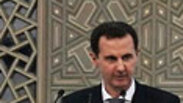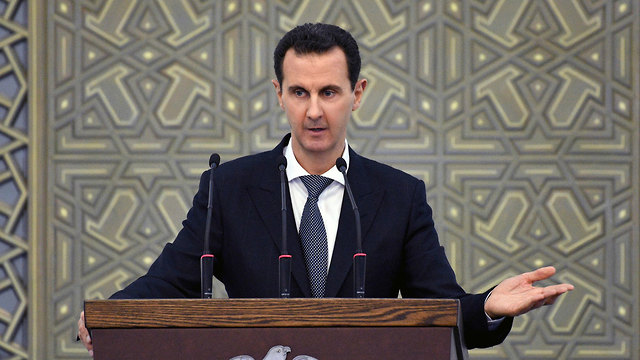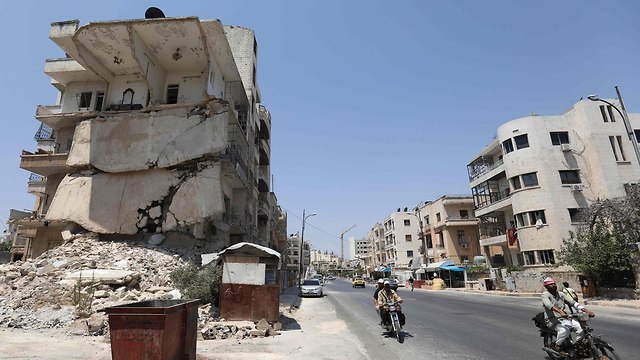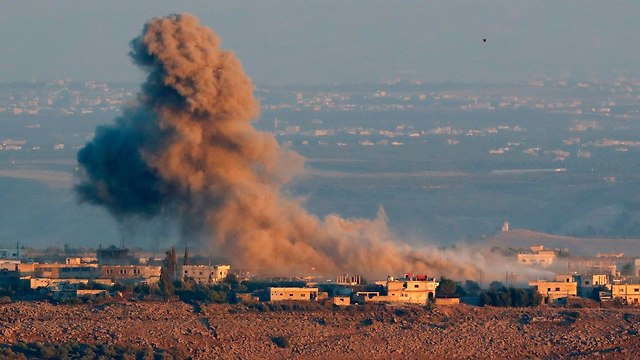
Assad
Photo: AP
Syrian President Bashar al-Assad has shown reluctance in recent days to make compromises on the re-writing of the country’s constitution, a step that many observers see as crucial in ending eight years of conflict and setting Syria on a path toward reconciliation and reconstruction.
“The constitution is the fate of the country and as a result, it does not succumb to any bargains that could have a bigger price than the war itself,” Assad said during a televised speech.
Last year, Damascus agreed to take part in a Russian-sponsored congress that tasked United Nations Special Envoy to Syria Geir Pedersen with forming a committee to draft the new document. Assad, however, has increasingly expressed dismay with opposition figures sitting on the committee which he described as “agents” of Turkey and other regional powers seeking to bolster anti-regime rebel groups.
The Syrian leader clarified that he believes the UN can play a constructive role in the political process but only if it respects Syria’s sovereignty. According to the UN-backed initiative, a new constitution would entail key reforms intended to mollify disaffected groups, primarily the country’s predominately Sunni population. This would set the stage for fresh elections.
But with Assad’s stalling over the restructuring, analysts are asking if the Syrian regime is setting the stage for many more years of insurgency.
Prof. Günter Meyer, Chairman of the World Congress for Middle Eastern Studies and Director of the Center for Research on the Arab World at the University of Mainz, told The Media Line that Assad has shown a willingness to reform the constitution, but simply opposes the makeup of the committee tasked with drafting one.
“There have been some changes introduced to the constitution in 2014,” he noted, which is evidence of Assad’s willingness to cooperate. “But of course a significant reduction of his power would not be in his interest, and he certainly does not want to have a majority from the opposition abroad, particularly from Saudi Arabia, taking part in the process.”
When asked if the absence of a constitution would simply engender more opposition from the country’s politically dispossessed, Prof. Meyer responded that such a scenario is unlikely.
“It is quite clear who is in power. Assad’s position has been improved dramatically with Russian and Iranian support.”
In a separate development, Washington has said that if the Kurds form an alliance with the Assad regime or Moscow, it will sever military assistance to the Kurdish-led Syrian Democratic Forces (SDF).
The Kurds have been making preparations for an expected attack from Turkey if or when U.S. forces pull out. In fact, they have asked Assad to set up a security buffer running through areas under their control in light of Turkish President Tayyip Erdogan’s desire to relocate as many as 3.6 million refugees to this region.
“This is not in the interests of the Kurds, but the alternative is clear: They have to accept that this can only be avoided when Damascus takes control of this area,” Prof. Meyer said.
Ankara regards the Syrian Kurdish fighters as an extension of the banned Kurdistan Workers’ Party, or PKK, which has waged a decades-long insurgency inside Turkey.
Dr. Moshe Ma’oz, Professor of Islamic and Middle Eastern Studies and an expert on Syrian politics at Hebrew University in Jerusalem, told The Media Line that Assad’s main aim is to preserve the existing constitution, unless his hand is forced by his primary backers.
“The lack of a constitution won’t produce another civil war because he is firmly in control. But the major issue is with Russia and Iran; both want to preserve his regime but are vying for influence, key investments and the country’s few natural resources.
“The Sunnis are of course the majority but don’t have any power,” Dr. Ma’oz continued, adding that “the Kurds, on the other hand, wield power in their autonomous regions, but are seeking recognized self-rule within Syria and the question is if a new constitution would allow it.
“The Turks would be very much against this, as well as the Iranians who want a unified Syria.”
In recent months, the Syrian regime has recaptured rebel-held territories except the last remaining holdout—Idlib Province in country’s northwest. The strife has left more than 450,000 people dead and displaced about half of Syria’s pre-war population of 22 million.



















